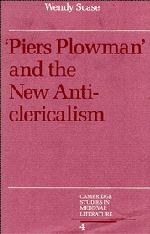Book contents
- Frontmatter
- Contents
- Preface
- Acknowledgements
- Note on quotations and references
- List of abbreviations
- 1 Introduction: tradition and the new anticlericalism
- 2 The usurpation of priestly power and the transformation of an antifraternal satire
- 3 Poverty: an old controversy and a new polemic
- 4 Charity: the ground of anticlericalism
- 5 Antireligious traditions and a new satire in the C-text
- 6 Clerical dominion and authority in new anticlerical literature
- Notes
- Bibliography
- General index
- Index of Piers Plowman citations
2 - The usurpation of priestly power and the transformation of an antifraternal satire
Published online by Cambridge University Press: 09 February 2010
- Frontmatter
- Contents
- Preface
- Acknowledgements
- Note on quotations and references
- List of abbreviations
- 1 Introduction: tradition and the new anticlericalism
- 2 The usurpation of priestly power and the transformation of an antifraternal satire
- 3 Poverty: an old controversy and a new polemic
- 4 Charity: the ground of anticlericalism
- 5 Antireligious traditions and a new satire in the C-text
- 6 Clerical dominion and authority in new anticlerical literature
- Notes
- Bibliography
- General index
- Index of Piers Plowman citations
Summary
THE THEORY OF DOMINION AND THE CONFLICT OVER PASTORAL CARE
Sire Penetrans domos takes his name, as has often been noted, from a long line of confessors of uncertain powers and dubious morals. But in Piers Plowman he has only the name of his predecessors, and very few of their characteristics. It is true that he successfully penetrates Unity, but his powers in the poem are so diminished that one medieval reader glossed ‘sire Penetrans-domos’ with simply ‘a general name for frere’. That other confessor of thirteenth-century satire, Faus Semblant, the shape-shifting friar-confessor in the Roman de la Rose, finds little employment in Piers Plowman; perhaps a part in the crowd as Ypocrisie in the assault on Unity (while in the Canterbury Tales he is transmogrified from friar into Pardoner). The diminution, in satirical literature of the later fourteenth century, of the powers of the traditional friar-confessor, arises from the transformation of an antifraternal satire, and provides a suggestive index of the nature of the change involved. In Piers Plowman the friars' pseudo-priestly powers to enchant and seduce are much weakened, even unnecessary. With Hende speche at the gate, magic is not needed to gain admittance to Unity and access to Conscience. In this poem, the claims of friars to priestly office as rivals to the parish priests, and the efficacy of their powers, are much less important issues than in the earlier satires. It is noteworthy that it is left to Chaucer's Pardoner (who makes no claim to priestly office at all) to raise the question of the relation between office and efficacy.
- Type
- Chapter
- Information
- Piers Plowman and the New Anticlericalism , pp. 15 - 46Publisher: Cambridge University PressPrint publication year: 1989



